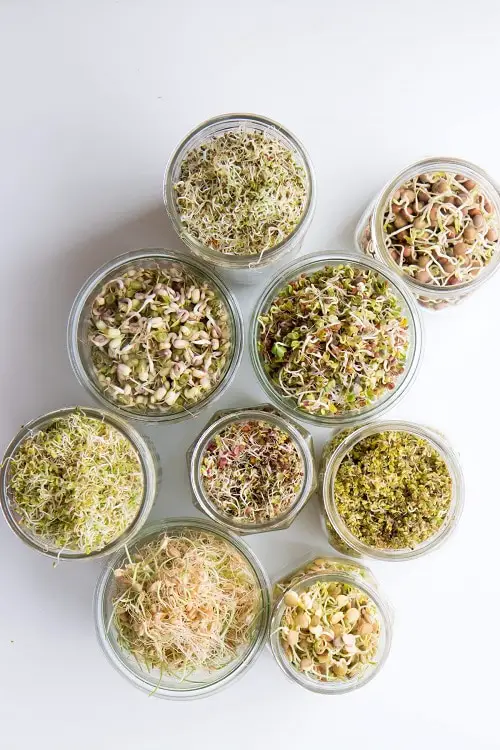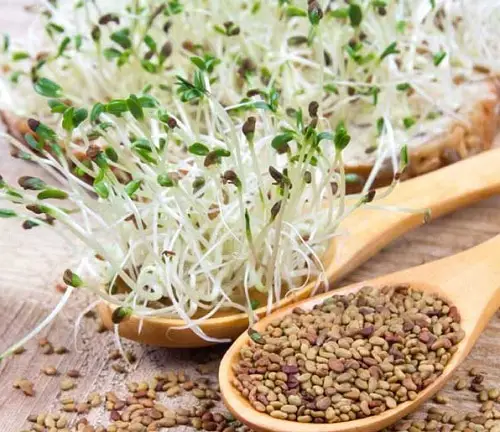Growing Sprouts at Home is a great way to add a fresh dose of these nutritional powerhouses in your daily meals! What’s more? This doesn’t take much time or space!
Growing Sprouts at Home is an easy, inexpensive, and nourishing way to provide necessary nutrition to yourself and your family. They’re pretty digestible and can provide necessary vitamins, antioxidants, and minerals!
Check out our article on growing microgreens without soil here
What are Sprouts?

Sprouts are germinated seeds with infant plant stems, unlike microgreens, which are baby plants. You can also grow them without soil where the seeds produce two small leaves, along with stem and root. This transformation can take place even on your kitchen countertop and you can then enjoy them in stir-fries, dips, sandwiches, and raw in salads!
Here are some of the best hacks to grow microgreens
Different Types of Sprouts

While, in theory, any seed can sprout if you’ll provide the right growing conditions. However, getting seeds that are specifically available for sprouts are devoid of any harmful chemicals and fungicides. They grow quickly and stay fresh for a good amount of time.
- Alfalfa: It has a mild flavor and goes well in salads and sandwiches.
- Lentils (Blue, Green, Red, Black): Flavor varies according to types. Pairs great in salads, soups, and dips.
- Mung Beans: Have a mild flavor, digestible, and go best in salads, curries, and stir-fries.
- Radish Seeds: Comes with a spicy taste and pairs well in salads, sandwiches, and dips.
- Sunflower: Has a peppery note and goes well in salads, sandwiches, and spreads.
- Broccoli Seeds: It has a mild flavor and pairs great in salads, stir-fries sandwiches, dips, and spreads.
- Clover: It too, has a mild flavor, and goes well in salads and sandwiches.
- Raw Almonds: Have a nutty, sweet flavor. Either eat directly or use them for cooking or baking. You can also make almond milk and smoothies.
- Adzuki Beans: They have a nutty taste and go well in salads, wraps, and smoothies.
- Chickpeas/Garbanzo: Have a rich and creamy taste, good for hummus salad, soups, and curry.
- Cashews: Rich, full taste. Use them as a creamy spread after mashing.
- Amaranth Seeds: Have nutty and slightly sweet flavor. Pairs well in salads and breakfast cereals.
- Oat Groats: Have a very mild taste. Goes well in chicken broth and rice dishes.
- Pumpkin Seeds: They have a tender flavor and goes best in salads and yogurts.
- Sesame Seeds: Have a nutty taste. Goes well in salads, curries, and sandwiches.
- Quinoa: Has a mild, beet-like, and nutty flavor. Great for salads and sandwiches.
Check out our article on best microgreens to grow here
Equipment to Grow Sprouts
There are many sprouting tools and makers available these days like containers with built-in sieves and multi-tiered arrangements for sprouting leaves, stem, and roots. If you want a quick and cost-free method, then using cheesecloth is best. Just moisten the cloth, put the seeds in, and wait for 3-5 days. Voila! Your sprouts will be ready!
How to Sprout Seeds?

Half a cup to few tablespoons of seeds is enough to produce sprouts for sandwiches and salads. You can take 2-3 tablespoons of small seeds like clover or alfalfa and 1/3 to 1/2 cup of large sprouting seeds like beans or lentils. Follow these steps while growing sprouts at home:
- Clean and rinse the seeds to remove dust or debris.
- Soak them overnight to encourage sprouting.
- Drain the water out and rinse the seeds again. Spread them evenly in a container and don’t allow seeds to pile up on each other.
- Rinse them every day to prevent slime. Pick seed skins to prevent rotting.
- The seeds will sprout in 3-6 days.
Storage
When your sprouts become sufficiently long and green, they are ready to store in the refrigerator. You can store them for up to 5 or 7 days.
Precautions
Your sprouting seeds could be contaminated with bacteria like salmonella, and e.coli, which is why it’s important to follow these tips:
- Always buy certified ‘pathogen-free‘ or organic sprouting seeds.
- Your sprout maker or container should be properly sanitized and water must be clean and filtered.
- Keep finished sprouts in the refrigerator.
Note: If you are old aged or have a compromised digestive or immune system, it is highly recommended that you must cook sprouts properly before consuming.


